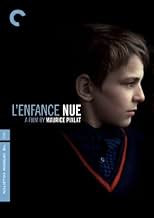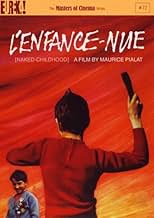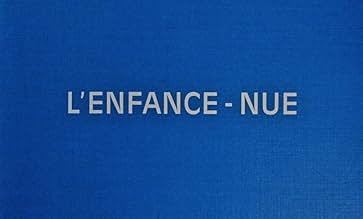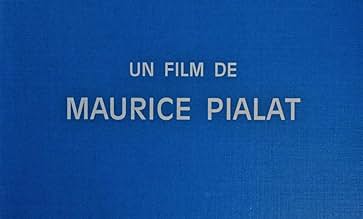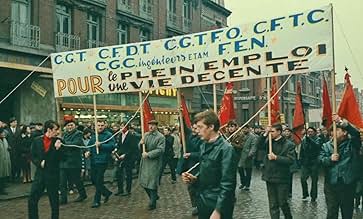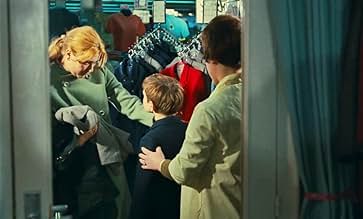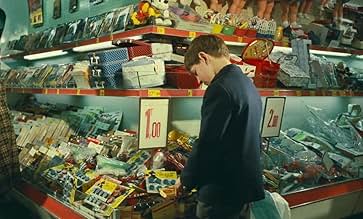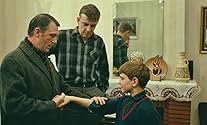CALIFICACIÓN DE IMDb
7.4/10
2.8 k
TU CALIFICACIÓN
Agrega una trama en tu idiomaAn anguished foster child takes to mischief and lies as his foster parents do their best to love and care for him. But it might be too little, too late in this emotionally devastating portra... Leer todoAn anguished foster child takes to mischief and lies as his foster parents do their best to love and care for him. But it might be too little, too late in this emotionally devastating portrayal of the orphaned child.An anguished foster child takes to mischief and lies as his foster parents do their best to love and care for him. But it might be too little, too late in this emotionally devastating portrayal of the orphaned child.
- Dirección
- Guionistas
- Elenco
- Premios
- 1 premio ganado y 1 nominación en total
- Dirección
- Guionistas
- Todo el elenco y el equipo
- Producción, taquilla y más en IMDbPro
Opiniones destacadas
It is quite extraordinary that 1968's L'Enfance Nue (or Naked Childhood) was the debut feature of a 43 year-old Maurice Pialat. Pialat would go on to direct a small number of highly-admired films after this, up until 1995, but it remains this film that he will be most remembered for. Similar in spirit but not in style to Francois Truffaut's masterpiece The 400 Blows, it follows the exploits of a troublemaking child who channels all of his rejection into ferocious anger that causes havoc with the people around him. Truffaut also has a co-producer credit for the film, although it would be the last time he would work with Pialat.
A young boy, Francois (Michel Terrazon), is placed in a home for bad children when his frequent outbursts and often psychopathic acts become too much for his mother. He is eventually re-homed and put into the care of an elderly couple, who also look after another older child, Raoul. When Francois warms to the elderly lady, his behaviour begins to become less hostile and he becomes familiar with his new surroundings. But a lifetime spent being unwanted has left it's mark on Francois, and he constantly remains unpredictable. Francois kills a cat, throws a knife at his new 'brother', and repeatedly steals from the other children. He is a horrific creation, and every parent's nightmare.
Pialat paints an interesting picture of France at the time. Without sledgehammering it home, he and the film depicts a time where a creeping poverty was lurking among the edges of suburbia. Perhaps this was one of the factors for Francois' parents being physically and mentally unable to keep the child, too distracted with their own situation that they don't have the time to get to the root of the problem. Or perhaps Francois is just a mischievous little bastard, and his inability to settle with one family before pushing them over the edge is his fault. L'Enfance Nue also has a surprisingly reserved depiction of the social services. They are seen simply doing their job, and repeatedly re- housing Francois every time he is rejected by a new foster family. This is where the genius lies in this film. Instead of using the film as a medium to send a social message (a la Ken Loach), Pialat sits back, points his camera, and tells a story. It is both complex and simple, but you would have to make your own mind up about that.
Much like Jean-Pierre Leaud in The 400 Blows, Michel Terrazon is fantastic in the lead role, brimming with menace and an unpredictability. Although the comparisons seem obvious, it would be wholly unfair to carry on comparing this to Truffaut's film, as L'Enfance Nue is a fantastic film in it's own right. Like most of his films, this is considered somewhat autobiographical to Pialat, but how much is unclear. His filmmaking techniques seem similar to the attitudes of the title character - this film is in your face and hard-hitting. You can almost hear the director yelling 'if you don't like it, then f**k you!'. A very, very good film, and I shall be seeking out more Pialat because of it. A remarkable debut.
www.the-wrath-of-blog.blogspot.com
A young boy, Francois (Michel Terrazon), is placed in a home for bad children when his frequent outbursts and often psychopathic acts become too much for his mother. He is eventually re-homed and put into the care of an elderly couple, who also look after another older child, Raoul. When Francois warms to the elderly lady, his behaviour begins to become less hostile and he becomes familiar with his new surroundings. But a lifetime spent being unwanted has left it's mark on Francois, and he constantly remains unpredictable. Francois kills a cat, throws a knife at his new 'brother', and repeatedly steals from the other children. He is a horrific creation, and every parent's nightmare.
Pialat paints an interesting picture of France at the time. Without sledgehammering it home, he and the film depicts a time where a creeping poverty was lurking among the edges of suburbia. Perhaps this was one of the factors for Francois' parents being physically and mentally unable to keep the child, too distracted with their own situation that they don't have the time to get to the root of the problem. Or perhaps Francois is just a mischievous little bastard, and his inability to settle with one family before pushing them over the edge is his fault. L'Enfance Nue also has a surprisingly reserved depiction of the social services. They are seen simply doing their job, and repeatedly re- housing Francois every time he is rejected by a new foster family. This is where the genius lies in this film. Instead of using the film as a medium to send a social message (a la Ken Loach), Pialat sits back, points his camera, and tells a story. It is both complex and simple, but you would have to make your own mind up about that.
Much like Jean-Pierre Leaud in The 400 Blows, Michel Terrazon is fantastic in the lead role, brimming with menace and an unpredictability. Although the comparisons seem obvious, it would be wholly unfair to carry on comparing this to Truffaut's film, as L'Enfance Nue is a fantastic film in it's own right. Like most of his films, this is considered somewhat autobiographical to Pialat, but how much is unclear. His filmmaking techniques seem similar to the attitudes of the title character - this film is in your face and hard-hitting. You can almost hear the director yelling 'if you don't like it, then f**k you!'. A very, very good film, and I shall be seeking out more Pialat because of it. A remarkable debut.
www.the-wrath-of-blog.blogspot.com
Arlette Langmann and Maurice Pialat wrote the screenplay for "Naked Childhood" and Pialat himself directed this film. In many ways, it is reminiscent of the story of Antoine Doinel in Truffaut's film "The 400 Blows", as it follows a neglected child through the foster care system--a very grim one indeed. Apparently, the story was inspired by an actual child who was raised by foster parents Marie-Louise and René Thierry--two folks who the director asked to appear in this film as the elderly foster parents.
This is the story about a young boy who was given up by his mother to the foster care system. The child, François (Michel Terrazon) acts out in response to being rejected in his first foster home--and as a result, is passed on to another foster home. The bottom line is that the boy has learned to be angry and violent and he appears to be headed for disaster unless something changes very quickly. Is there any hope for the kid? Can the elderly couple get through to him? This is an unusual film because it does not feature non-stop action and suspense. Sometimes the film is a bit slow--but not in a bad way--more like real life. It also features a little boy who is far from perfect but who is not constantly bad, either--he's more amoral than anything else. I liked this, as life is very rarely black & white--though it frequently is in movies. And, the film really doesn't have an ending. Because of this, the film feels more like a slice of life than a movie--which is pretty typical of the French New Wave style of the 1960s. It's probably not the sort of thing the average viewer would like, but it is a quality production. While this sort of thing does not make for the most pleasant viewing, having worked in the welfare system myself many years ago, I can certainly relate to the story of the boy--having seen kids passed on from one home to another to another. It's really no wonder the kids often act out and what is amazing is that many don't!
This is the story about a young boy who was given up by his mother to the foster care system. The child, François (Michel Terrazon) acts out in response to being rejected in his first foster home--and as a result, is passed on to another foster home. The bottom line is that the boy has learned to be angry and violent and he appears to be headed for disaster unless something changes very quickly. Is there any hope for the kid? Can the elderly couple get through to him? This is an unusual film because it does not feature non-stop action and suspense. Sometimes the film is a bit slow--but not in a bad way--more like real life. It also features a little boy who is far from perfect but who is not constantly bad, either--he's more amoral than anything else. I liked this, as life is very rarely black & white--though it frequently is in movies. And, the film really doesn't have an ending. Because of this, the film feels more like a slice of life than a movie--which is pretty typical of the French New Wave style of the 1960s. It's probably not the sort of thing the average viewer would like, but it is a quality production. While this sort of thing does not make for the most pleasant viewing, having worked in the welfare system myself many years ago, I can certainly relate to the story of the boy--having seen kids passed on from one home to another to another. It's really no wonder the kids often act out and what is amazing is that many don't!
Naked childhood or L'enfance nue (original title) is a film that deals with issues such as under-privileged children, foster-parenting and in general children being raised apart from their parents. The director approaches his subject with a realistic, almost documentary narrative with the least amount of dramatization. Therefore viewers will be shown a pretty straightforward story about a troublesome kid and what he is going through with foster-parents, school, social service agents and so on.
I think the film does a good job at showing us that no one's to blame for what eventually happens in these scenarios and yet the current method is a failure for these children. It's a film that is not very shocking or disturbing (although there are couple scenes) but it can make one think for a while.
I think the film does a good job at showing us that no one's to blame for what eventually happens in these scenarios and yet the current method is a failure for these children. It's a film that is not very shocking or disturbing (although there are couple scenes) but it can make one think for a while.
The ten year-old boy François (Michel Terrazon) is left by his parents for adoption. His foster families become unhappy with his evil behavior, practicing small thefts, killing pets and provoking car accident and reject him.
"L'enfance nue" is one of those well-made films that gives the sensation of a documentary to the viewer. In the late 60's, it was probably a realistic childhood docudrama to be discussed about orphaned children. Unfortunately the storyline is dated in 2017 and the troublemaker François is not as bad as he was in 1968. My vote is six.
Title (Brazil): "Infância Nua" ("Naked Childhood")
"L'enfance nue" is one of those well-made films that gives the sensation of a documentary to the viewer. In the late 60's, it was probably a realistic childhood docudrama to be discussed about orphaned children. Unfortunately the storyline is dated in 2017 and the troublemaker François is not as bad as he was in 1968. My vote is six.
Title (Brazil): "Infância Nua" ("Naked Childhood")
10nmegahey
Looking not unlike Jean-Pierre Léaud, Michel Tarrazon's young 10 year-old tearaway François could very well be an alternative continuation of the story of Truffaut's Antoine Doinel after the 400 Blows (Truffaut indeed was one of the film's producers alongside Claude Berri), but the treatment from Maurice Pialat, in his first feature film, is notably more harshly realist. Abandoned by his parents, François is passed from one foster family to another, each of them finding it impossible to control a young boy who inevitably has behavioural problems and gets into a lot of trouble torturing cats, stealing from other kids and wielding a large knife. Although he is given love and affection by the poor families who take him in for the little extra money they will receive, he inevitably never feels like he belongs and ends up turning against the people who want to help him.
Made when he was 43 years old, L'Enfance Nue clearly has strongly autobiographical elements although Pialat wasn't placed in the hands of the social services, he was brought up by his grandparents and did feel abandoned by his parents. The film also depicts the social circumstances of the period and the poverty of the outlying suburban districts (already the subject of the director's 1961 short film L'Amour Existe). Using non-professional actors, L'Enfance Nue consequently also has a certain almost documentary-like realism that would become characteristic of Pialat's hard-hitting style.
Made when he was 43 years old, L'Enfance Nue clearly has strongly autobiographical elements although Pialat wasn't placed in the hands of the social services, he was brought up by his grandparents and did feel abandoned by his parents. The film also depicts the social circumstances of the period and the poverty of the outlying suburban districts (already the subject of the director's 1961 short film L'Amour Existe). Using non-professional actors, L'Enfance Nue consequently also has a certain almost documentary-like realism that would become characteristic of Pialat's hard-hitting style.
¿Sabías que…?
- TriviaMarie-Louise Thierry and René Thierry were real life foster parents. Maurice Pialat became acquainted with the couple and cast them in lead roles after he began researching the plight of children in the foster care system.
- ConexionesFeatured in Il tempo che ci vuole (2024)
Selecciones populares
Inicia sesión para calificar y agrega a la lista de videos para obtener recomendaciones personalizadas
- How long is Naked Childhood?Con tecnología de Alexa
Detalles
Taquilla
- Total a nivel mundial
- USD 1,993
- Tiempo de ejecución1 hora 23 minutos
- Mezcla de sonido
- Relación de aspecto
- 1.66 : 1
Contribuir a esta página
Sugiere una edición o agrega el contenido que falta

Principales brechas de datos
By what name was L'enfance nue (1968) officially released in Canada in English?
Responda
